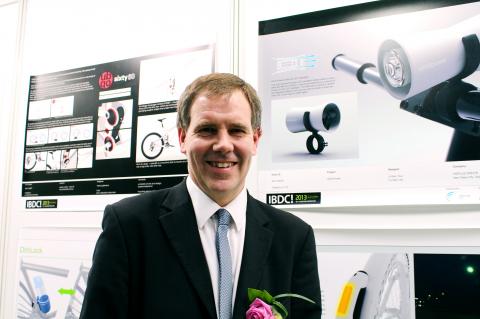Taiwan needs to lower its speed limits and allocate more space for cyclists if it hopes to achieve its aim of becoming a “cycling island,” a visiting expert said.
“The first thing I would tackle is speed,” European Cyclists’ Federation director Kevin Mayne said on Wednesday at the Taipei International Cycle Show.
Mayne, whose federation consists of European national cycling organizations, said speed limits in Taiwan are too high for cars and scooters to coexist with cyclists.

Photo: CNA
Bicycle-friendly cities usually have speed limits of below 30 kilometers per hour, he said, citing German and Dutch cities as examples.
He said lowering speed limits is also a cheap solution to changing Taiwan into a cycling paradise, as nothing needs to be built.
“What you need is political will and enforcement,” he added.
Mayne said cities in Taiwan should allocate more space for cyclists and take bolder steps to improve the environment, citing New York, Paris, London and Vienna as examples of cities that are doing so and upon which Taiwan could model itself.
He said the bike-sharing system in Paris, for example, offered 15,000 bikes when it was first launched, while Taipei’s bike-sharing system, Youbike, currently offers only 1,500.
“Too many cities have started [bicycle schemes] too small,” he said.
Taiwan’s strong bicycle industry could be used to the nation’s advantage in developing it into a cycling paradise, Mayne added.
The Taiwanese people’s underlying interest in cycling — evident in the fact that many people still ride bikes on the roads despite the traffic conditions — is also an advantage, he added.
He said there are economic benefits to turning Taiwan into a “cycling island,” including savings in public health, transportation costs and road repair, lower carbon emissions, better air quality, less traffic congestion and a more vibrant and healthier society.
According to King Liu (劉金標), chairman of Taiwan’s bicycle titan Giant, the government invested NT$3 billion (US$100.85 million) to build 2,088km of bike lanes around the nation from 1999 to 2011.
The government plans to invest a further NT$1.2 billion to build more bike lanes in the next four years, he added.

Taiwan is stepping up plans to create self-sufficient supply chains for combat drones and increase foreign orders from the US to counter China’s numerical superiority, a defense official said on Saturday. Commenting on condition of anonymity, the official said the nation’s armed forces are in agreement with US Admiral Samuel Paparo’s assessment that Taiwan’s military must be prepared to turn the nation’s waters into a “hellscape” for the Chinese People’s Liberation Army (PLA). Paparo, the commander of the US Indo-Pacific Command, reiterated the concept during a Congressional hearing in Washington on Wednesday. He first coined the term in a security conference last

Prosecutors today declined to say who was questioned regarding alleged forgery on petitions to recall Democratic Progressive Party (DPP) legislators, after Chinese-language media earlier reported that members of the Chinese Nationalist Party (KMT) Youth League were brought in for questioning. The Ministry of Justice Investigation Bureau confirmed that two people had been questioned, but did not disclose any further information about the ongoing investigation. KMT Youth League members Lee Hsiao-liang (李孝亮) and Liu Szu-yin (劉思吟) — who are leading the effort to recall DPP caucus chief executive Rosalia Wu (吳思瑤) and Legislator Wu Pei-yi (吳沛憶) — both posted on Facebook saying: “I

The Ministry of Economic Affairs has fined Taobao NT$1.2 million (US$36,912) for advertisements that exceed its approved business scope, requiring the Chinese e-commerce platform to make corrections in the first half of this year or its license may be revoked. Lawmakers have called for stricter enforcement of Chinese e-commerce platforms and measures to prevent China from laundering its goods through Taiwan in response to US President Donald Trump’s heavy tariffs on China. The Legislative Yuan’s Finance Committee met today to discuss policies to prevent China from dumping goods in Taiwan, inviting government agencies to report. Democratic Progressive Party Legislator Kuo Kuo-wen (郭國文) said

Sung Chien-liang (宋建樑), who led efforts to recall Democratic Progressive Party (DPP) Legislator Lee Kun-cheng (李坤城), was released on bail of NT$80,000 today amid outcry over his decision to wear a Nazi armband to questioning the night before. Sung arrived at the New Taipei District Prosecutors’ Office for questioning in a recall petition forgery case last night wearing a red armband bearing a swastika, carrying a copy of Adolf Hitler’s Mein Kampf and giving a Nazi salute. Sung left the building at 1:15am without the armband and covering the book with his coat. Lee said today that this is a serious